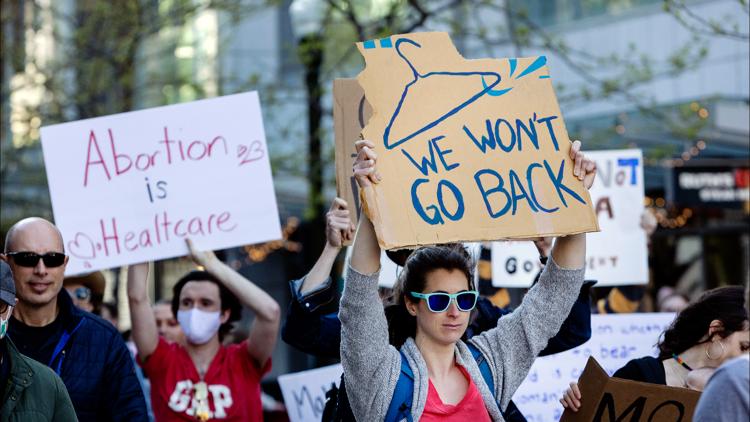PASADENA, Calif. — A federal appeals court scrutinized the impact of Idaho's strict abortion ban on emergency medical care on Tuesday, weighing whether the ban criminalizing abortions should be enforceable in life- and health-threatening situations.
John Bursch, an attorney with the Alliance Defending Freedom representing Idaho, asked the 9th U.S. Circuit Court of Appeals panel of 11 judges to urgently lift the injunction preventing the state from enforcing its abortion ban in emergency room settings, saying it “harms Idaho sovereignty, harms women, (and) harms unborn children.”
“It's here before you now, you should decide it,” he said.
Idaho’s law makes it a felony to perform an abortion unless the procedure is necessary to prevent the death of the patient.
President Joe Biden’s administration sued Idaho two years ago, contending the law violates a federal rule called the Emergency Medical Treatment and Labor Act, or EMTALA, because it prevents doctors from performing abortions that save their patients from serious infections, organ loss or other major medical issues.
The U.S. Supreme Court heard the case earlier this year but bounced it back to the lower court on a procedural issue, leaving unanswered questions about the legality of the state abortion ban. That will be determined at a later date, but the 9th Circuit's ruling could decide whether the law can be enforced while the lawsuit is still working its way through court.
During Tuesday's hearing, the judges raised a number of hypothetical situations as they tried to determine whether the ban can coexist with EMTALA.
Judge Lawrence VanDyke raised the hypothetical of a doctor presented with an organ that would save a patient’s life but which was unethically harvested under state law. If a state has outlawed the use of questionably harvested donor organs, he asked, can the federal government require that treatment?
“Do you think a state’s ethical concerns … have any role to play?” asked VanDyke.
Catherine Carroll, an attorney for the U.S. government, said it was difficult to grapple with the hypothetical since organ transplants do not occur in emergency rooms, but said state ethical concerns about medical treatments could come into play only if the treatments did not violate EMTALA.
Judge Salvador Mendoza Jr. said that he lives in eastern Washington, not far from the Idaho border. The only obstetrics department in the nearby city of Sandpoint, Idaho, shut down after the abortion ban was passed, he noted, leaving no available medical services for women who are “bleeding out” from pregnancy complications, he said.
“That’s the very thing that Congress was trying to avoid” by establishing EMTALA, Mendoza said. “They were trying to set a baseline of medical care for the country.”
But Taylor Meehan, an attorney for the Idaho Legislature, said EMTALA is “not the statute to solve that particular circumstance.” She said an Idaho Supreme Court ruling in another lawsuit over the state's abortion law made clear that abortion is allowed when patients are experiencing catastrophic bleeding.
Another judge asked why Idaho's lawmakers didn't just add specific examples to the abortion ban to make it clearer — perhaps including that abortion is allowable to treat catastrophic bleeding, or in cases where a pregnant person's water has broken too soon, putting them at risk of dangerous infection.
Meehan said that would be a bad idea, because the more detail that is added to the statute, “the less room you give” to a physician's professional judgment.
“To the extent there’s confusion, I think that that’s confusion for failure to read the Idaho Supreme Court decision for what it says, not confusion created by the law itself,” Meehan said after the hearing. The Idaho court’s ruling against Planned Parenthood in January 2023 gives “wide room” for a physician’s “good faith judgement” in deciding medical treatment, Meehan said.
Dr. Jessica Evans-Wall, an emergency room physician in Boise, said she hopes a ruling from the 9th Circuit panel would offer real clarity for her and other Idaho physicians.
“We’ve had cases in the department where we have had to get legal involved,” even at 2 a.m. on a weekend, Evans-Wall said. “It creates a big delay in care, where we have to clarify, ’Hey, medically this is what I’m worried about, but it might not happen immediately — do we need to transfer this patient to Oregon? And that creates delays for the whole department."
About 50,000 people in the U.S. develop life-threatening complications during pregnancy each year. Those complications can include major blood loss, sepsis, or the loss of reproductive organs. In rare cases, doctors might need to terminate a pregnancy to protect the health of the pregnant person, especially in cases where there is no chance for a fetus to survive.
“We’re only involved when there’s an emergency, when a patient’s life or health is affected,” said Evans-Wall. “I think it sometimes comes across like, ‘Oh, we’re choosing the pregnant person over the pregnancy,’ but the truth is if that pregnant person is having serious complications where their life or health is at risk then the viability of that pregnancy is not there. It’s not a choice that we’re making saying we’re going to prioritize the pregnant person over that pregnancy. Because of the medical circumstances, that choice has already been made.”



